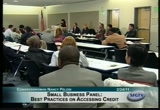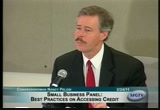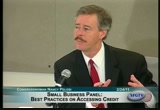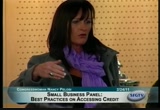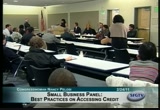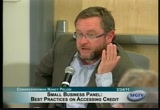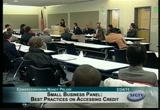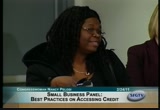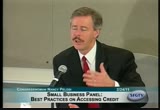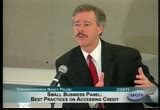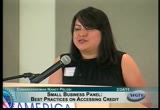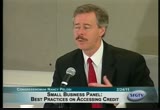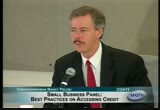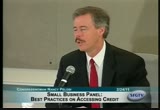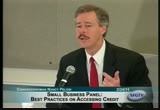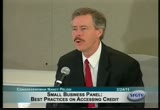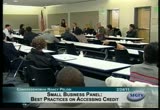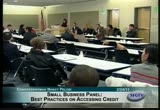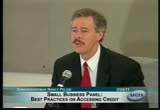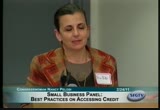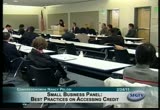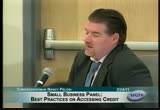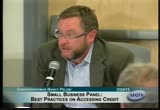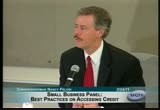tv [untitled] October 28, 2012 4:30am-5:00am PDT
4:30 am
so my question is, where do you go, if you do not have a lot of collateral, you do not have a lot of credit, have the you go about securing a line of credit? i have a lot of contracts for the next two years, but as my company grows, i cannot keep up with payroll. >> we have made loans in those situations. if you have contracts and can show us how they are going to be paid, if your credit is good, we would certainly like to take a look at that. we do not currently offer -- i should be careful. it is on and off whether we have a true line of credit. sometimes it can be structured in such a way to meet your cash flow needs, we can disperse it
4:31 am
over time, allow you to pay it down. we have brochures back there. i encourage you to talk to us. >> let me add on that. over the last several years, a lot of small businesses have relied on their personal credit as a means to support the business. also, they relied on home equity lines of credit, which in many cases do not exist anymore, also as a source for financing their business. as far as doing public contracting, one thing about public contract in that you can count on is the city of san francisco will stay in business and pay its debt, just later than you would like it to be. when you're doing public contract thing, if you will, cash cycle -- when you do the work and when you get paid is something you have to factor into your understanding of capital needs.
4:32 am
so you have to figure that into the process. usually, that is figured into the pricing. but it is also the case that would you also probably need is a line of credit. depending on whether you feel your credit situation is where you want to go to a bank like wells fargo or another regulated bank, and line of credit, or work for a working- capital type of loan, which is something you look to do, the opportunity fund. you probably want to try both avenues. as far as your credit scores, everyone realizes, everyone here has a credit score. the first thing any lender will look at is your credit score. after looking at that, they all do not do the same thing with
4:33 am
it. an opportunity fund will look at your story in addition to your score. some are limited to your score, that if it is above or below a certain threshold, and they are may not work with you. not every one of the lenders is going to see your situation the same, so you should be shopping. >> [inaudible] >> you can do contract financing. that exists. but a line of credit is probably what you're looking for. >> thank you, marc. i have a question from the audience about a burgeoning market. any avenues for san francisco medical cannabis dispensaries? open to the panel.
4:34 am
>> in terms of financing? i can tell you what will be the licensing and zoning regulations, but i think i would turn it over to our financial institutions, in terms of -- in terms of the type of business that you would consider financing. >> we look at all kinds of business. we always want to see a business plan. we want to see the cash flow. just like the lady before, you can have a good plan, but if you do not have cash -- good credit is always important.
4:35 am
people sometimes have no cash or they may have a cosigner or partner that could help. >> opportunity fund is a 51 say -- 501 c nonprofit and we can make the bay area a better place especially for low and moderate-income communities. some of our funding sources, like the sba, certain kinds of businesses we cannot lend to. adult entertainment, primarily, alcohol sales, and then there are some things that we decided we are not going to lend to. we choose not to lend for fire arms sales. medical cannabis, to be honest, as the ceo of a non-profit, i may not want to open up that can of worms.
4:36 am
we have a lot of people that donate money to our program. given that that there is a discrepancy between federal and state law on that, strong beliefs that people have about it, we make a pledge that we will look at every loan to make sure there is positive community impact. i think that is at least controversial enough to choose not to do it. we have not had a request yet, so i have not had to rule on that. >> we have a question in the back. >> i wanted to ask wells fargo, what is your interest rate on a loan? >> 6%. 2.75% over prime. >> ok. the second question, is a line of credit like a payroll advancement? i am a small business. just recently got contracts in
4:37 am
san francisco. as you say, they pay slow. i want to get a loan for $50,000, but i do not want to pay the interest. i would like to get a payroll advancement where the money is available to me, should i needed for payroll. if i should need it, i can get that money. when the city pays me back, i pay them back, but that line of credit is still there. is that what they line of credit is? >> yes, ma'am. as you have a need for something to pay -- in this case, your bills -- before you get your invoices paid, that you would be able to do that. a line of credit is typically the way that most small businesses deal with cash flow
4:38 am
variations. when invoices are paid, you pay down your line. that is slightly different from a permit working capital loan. those businesses that need permanent working capital for their business on an ongoing basis. in some cases, one can be used interchangeably. typically, what you are describing is a line of credit. when you go to a lender, you want to show them that you have the contracts that will be able to pay. lines of credit are typically going to be based on the credit scores of the business in this case. an important piece is making sure we do everything to know what our credit scores are. >> what is an average to good credit score? >> mark mentioned the 650.
4:39 am
65250 to 700 is typically what e see. when credit markets are tight for financing and regulators are cautious about seeing their banks make loans, they keep pushing the credit scores further and further up. that is why it is an important avenue to be able to have non- traditional lenders, like opportunity funds and micro lenders, who can look at a business and see a credit score that might not be strong, but there might be a story behind that number. medical issues, other things that do not impact your business but impact your credit score. they can hear your story and understand your circumstance. >> i have a question.
4:40 am
this is probably for myself or mark. what impact will be cuts in the sba budget have on the sba program? it seems the small business committee is try to make drastic cuts. from our perspective, the new majority leadership is looking to make drastic cuts, many of the program will hold near and dear to our hearts. the question the leader is continually asking is, show me the jobs. she wants to see house bills come to the floor that create economic opportunity for middle- class -- all of americans. if the small business committee is looking to cut funds from the sba, we see that as a detriment. we do not believe in cutting to
4:41 am
create more jobs. we agree with the idea of the recovery act, putting more money out there to get people employed. >> on congressional action, that is not my role. in san francisco, we have been the beneficiary. all small businesses should be aware that we have been the beneficiary of a lot of good resources for small businesses. we have more nonprofits that are funded through micro lending here in the city from sba programs. some are expected to be looked at for budget cuts. some will continue. but we have more of those programs in san francisco, really, in any other city in california. we also have a small business commission. that is unique. the folks who are here, who have been supporting small business for many years are the reasons
4:42 am
why san francisco's small business community has a voice in ways that other cities and businesses in those cities do not. i think we have, in san francisco, the benefit of a lot of good resources here, some of which are here because of federal funds, some of which because folks in this room have been an advocate for small business. we are hoping the impact of tight budgets all levels still allows us to have the tools we have been able to use for small business. it is an important piece. >> [inaudible] >> there have been a cut in the budget. he wanted to know how that would cut the sba program. >> now we are getting into
4:43 am
arcane budget discussions. the 2012 budget does slate a couple of sba programs for cutting. it also talks about cuts comparing next year to prior years, when we were the beneficiaries of stimulus funds, jobs act funds. one time-type things are being set as benchmarks. a cut from those one time- funding pieces that were not expected to be continued. in some ways, we do not see it as big as a cut. speaker pelosi was important to us in the jobs act in getting a lot of money put into the sba program. it allowed california to be the beneficiary of having hired guarantees for banks, no sba loans fees. in the first quarter of the year, lending in california was
4:44 am
the most we ever did. we did $1 billion worth of small business loans in december, for example. that is something we have never done before. but that was a one time funding piece. going forward, on the loan side, we are not going to see the cuts have an impact on sba lending. the big issue we see are two issues. the value of california real- estate, stability of businesses in california, and the confidence of our workers looking for credit. those are variables that would be important. >> thank you. we have a question in the back. >> good afternoon. thank you to nancy pelosi and for you panelists for providing this informative seminars. for our young company, we are a distribution company.
4:45 am
i just heard you mention that you do not loan for the sale of alcohol. is that separate from distribution of wine? >> s.p.a. -- sba makes loans to winery's, stores that sell wine. i am not exactly sure what role you play in distribution. the federal government ought -- got out of prohibiting alcohol and long time ago. we are not in the business of regulating all bohol, beverage distribution or sale. we make loans to businesses who sell alcoholic beverages, restaurants, stores. so is not an sp a prohibition. it is regulated on a local level.
4:46 am
we have made loans to a lot of businesses that have some degree of an alcoholic beverages, one distribution. >> terrific. following up to that, can you give any advice on particular resources that would speak perhaps to any tax benefits, subsidies in place for both domestic distribution of wine, as well as exports? >> why don't we take it off line. i think what is the case, there is a lot of complexity to the incentives that were put into the jobs act for small businesses to take advantage of on expensing equipment, investments and their businesses, as far as the tax treatment of those activities. obviously, as a small-business person, each of you needs to
4:47 am
understand, it is complex, but there are a lot of tax incentives and investment in business that you should take aware -- advantage of. >> we have two questions in the back. just to be mindful for everyone's time, we will go for about five more minutes. >> my name is david. i am an internet or entrepreneurs. in general, to the lenders, what type of vanity do you traditionally see approach you for loans, an llc, corp., and who is liable, for whose borrowing the money? >> as a micro lender, we expect the principles, the corporate form, to provide guarantees.
4:48 am
>> personal guarantees. >> the same. 20% ownership in the company. [inaudible] >> [inaudible] >> i heard something about sba guaranteed loans. maybe i missed something. does that have to do with the sba guaranteeing the entity? >> the question on the sba guaranteeing a entity as the order of the business, whether it is a corporation or partnership, for any small business lending, you should expect to be guaranteeing that long personally. as a small-business owner, from a lender's point of view, we
4:49 am
want to see that you are as invested in the business as you are asking the bank to be. the idea that non recourse loans, the way you describe it, loans that you get without having yourself personally liable is not the way it works. you should assume you will guarantee the loan regardless of the structure of your business. the good news, though, for businesses like you are describing, internet business, is that the capital requirements for that type of business is generally small. you are able to get yourself further along and share in revenues with a smaller amount of credit need. that is where we see a lot of businesses and personal service or internet business get started, and generate revenues and be able to show growth without needing any capital,
4:50 am
like a brick and mortar business might. >> my name is terry said. i have a retail business in san francisco for 22 years. i have a 5 04 -- 504 loan. it took me three years to get. we need more capital. i tried to get a line of credit from wells capital. i was decline. where does someone like myself go? i have a loan, i need additional funding. >> did you try through the sba? >> i already have an sba loan. i went to wells fargo for a line of credit and they would not give me one. >> i can speak to you about it. when we look at funds that are needed, the biggest thing we look at our cash flow.
4:51 am
i can address that with you. unless there is an issue, at that point -- [inaudible] >> let's talk, ok. >> i have a couple of more questions. i know that the panelists have agreed to stay after for those who have specific questions. i do have one question for wells fargo. what are the typical rules for applying for sba loan of less than $50,000? how much money do we need to have in your bank to apply for a loan? >> i am on the smaller side of the bank. i am a transaction guy. i do not technically require one to have an account to do a loan
4:52 am
with. what i look for, i generally start at 100,000 and up. when it is a requirement of 50,000 or less, i tend to call of the micro guys to help me out. that is right in their box. for us, the capacity for us to do the smaller side is not there as much as it is for them. on getting a loan through my side of the bank, i do not require an account to do that. we would like to have it, but i do not require it. >> last question for the opportunity fund and a critic representative. are you a cdfi?
4:53 am
is san francisco and s.p.a. in support of cdfi's being established in san francisco? >> yes, we are. we were founded in 1999 with a small business loan. that is how we started our tenderloin office. >> opportunity fund is a certified cdfi, so we are providing a benefit to low and moderate-income communities. he is the city establishing support for new cdfi's? >> mark wanted to address that, in support of cdfi's in the city. >> we have a wealth of partners in the city.
4:54 am
s.p.a. is just now rolling out a program for r -- will be the case by the summer. let me get one last point and on the question about relationships to lenders. the question was, do have to have an account with a bank in order to get a loan? may answer is no, but the real answer to it is certainly want to do that. one of the things we see as an important thing for you, as a small-business person to establish a relationship with a lender on a variety of levels before you look for funding. part of that is opening an account with them, letting a lender know about your business, understand your business, talk to them as you are growing your business. when the economy is strong, all lenders are shopping for transactions.
4:55 am
in times are tough on credit, you want to rely on those deeper liberation ships with your lender. you want to develop a relationship with a lender. it is the case where you want to open up an account, while to have another bank services that you want to have a relationship with your lender with it because when you go to them for any loan requests, you want them to know about your business and feel like they are a partner of yours, not just that you are shopping them. if you are shopping, you are just looking for the best deal from them, rather than a long- term relationship. >> i want to thank everyone for coming. hopefully, you have all signed up for our updates. we are going to be hosting these on a regular basis. the next two coming up will focus on becoming a government contractor, how your small business can partner with the government.
4:56 am
the next one will also be on how to grain your business, with tax -- green your business, tax credits available with that. for non-profit, charitable organizations, we have a workshop coming up. that is helpful for those of you who are looking to access the committee on a durable basis. >> also, on behalf of leader pelosi, i want to thank our panel and her staff. we are tenants in this building. i apologize for the security situation that happened upstairs. if you have concerns about it, please come and see me. i would like to convey those to the landlord here so that it does not happen again.
4:59 am
>> so again good morning everyone. i am ed risk. i am the transportation director in the great city of san francisco and it's my great pleasure and delight to welcome you today to a great celebration. what we're celebrating here is the partnership that many of you that are with us today that have gotten to this point. we are celebrating the fact that we have gotten to this point and the investments that will central sup way will bring to san francisco and what it means for this city and this region. i can't tell you what an honor and privilege it is to serves as the transportation director in this great city. we ordered san francisco weather to deep the dust down and we
138 Views
IN COLLECTIONS
SFGTV2: San Francisco Government Television Television Archive
Television Archive  Television Archive News Search Service
Television Archive News Search Service 
Uploaded by TV Archive on

 Live Music Archive
Live Music Archive Librivox Free Audio
Librivox Free Audio Metropolitan Museum
Metropolitan Museum Cleveland Museum of Art
Cleveland Museum of Art Internet Arcade
Internet Arcade Console Living Room
Console Living Room Books to Borrow
Books to Borrow Open Library
Open Library TV News
TV News Understanding 9/11
Understanding 9/11